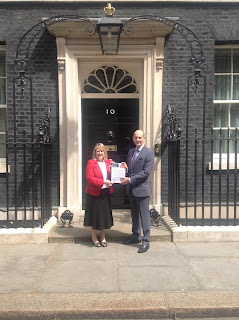MP backs
local WaterAid activists' “Great Stink” call for taps and toilets for all
Local MP Fiona Bruce met
WaterAid activists Mark Barker from Sandbach and Tina Lamont from Holmes Chapel
to back WaterAid’s call for the UK
Government to lead the way in ending the global water and sanitation crisis.
This campaign marks 150 years of Britain’s modern sewer systems.
They presented Fiona with
a report entitled 'Another Great Stink' which has been personally presented to
over 100 parliamentarians this month. The report reminded them that Britain’s
first life-saving sewerage system was created following the ‘Great Stink’, when
the stench of the polluted Thames was so unbearable, it sent MPs running from
the House of Commons clutching handkerchiefs to their faces and spurring them
into action to clean up the city.
Mark and Tina said “It’s very easy for us to take clean water
and toilets for granted, but for millions of people across the world, these
basic necessities are a luxury. It shouldn’t be this way. The report shows parliamentarians what life was like in
Victorian Britain when people lacked access to safe water and there was no
decent sewerage system. I’m proud of the UK’s commitment to
international development and hope our Government will listen to our call to
take action to ensure everyone everywhere has clean water to drink and somewhere
safe to go to the toilet. Together, we can make it happen.”
Fiona, who has recently
been re-elected to Parliament's International Development Select Committee for
a second term, said: “ Our parliamentarians acted decisively 150 years ago
to provide proper sanitation to people in this country and I fully support
WaterAid's drive to ensure that everyone in the world has the same basic
neccessities of clean water and proper toilets. Our Government has a great
record in international development and I will urge them to make water and
sanitation a top goal in UK and world aid priorities.”
The opening of the first
modern sewage pumping station in 150 years ago, designed by Sir Joseph
Bazalgette, helped prevent cholera outbreaks in London. The disease had had a
devastating impact across the country since its arrival in 1831, similar to the
effect of Ebola in West Africa today. This marked the start of Britain’s drive
to protect public health through good sanitation with similar transformations
following across the country.
This year also has a
global significance, as the framework for the development priorities for the
international community until 2030 is being agreed in September.
Mark and Tina were among 115,056 supporters who signed
WaterAid’s ‘Make It Happen’ petition calling for taps and toilets for everyone
everywhere which was recently presented by WaterAid Chief Executive Barbara
Frost to Baroness Verma, Parliamentary Under Secretary of State
at the Department for International Development. Barbara said:
“Our own history shows how water and
sanitation can transform a nation, helping to create a healthier and more
prosperous society.
“Today, 650 million people across
the world still lack access to clean water and 2.3 billion have nowhere safe to
go to the toilet. Life in a densely populated slum bears
far too close a resemblance to UK cities in the 1800s, representing a real and
growing threat to global health and stability. Diarrhoea
caused by unsafe water and poor sanitation is the second biggest killer of
under-fives worldwide, claiming the lives of 1,400 children every single day.[i]
“The stink may be a bit further from
Westminster now; but that’s no reason not to act. With
the right political will, we can solve the global water and sanitation crisis.
This year we have a unique chance to right this wrong as world leaders agree
the new Sustainable Development Goals to eradicate poverty over the next 15
years. Only with investment in sanitation
can we achieve a safe and secure future for everyone everywhere.”
WaterAid is calling for increased investment in water and
sanitation in order to achieve improvements in health and other development
areas, as having access to these simple services is the foundation to climbing
out of poverty. For example, for every £1 invested in sanitation there's a return of
around £5 in increased productivity.[ii]
The charity is calling for the UK Government
to:
·
Increase the proportion of aid
spent on water, sanitation and hygiene by at least 1% every year over the next
parliament to enable the UK to become a leader by 2020.
·
Maximise the
impact of UK Aid investments by making sure that water, sanitation and
hygiene services are in all health clinics, schools, maternal, newborn and
child health strategies, and plans to tackle gender inequality.
·
End Aid Dependency by working with developing country governments to
deliver and sustain water, sanitation and hygiene services as part of
sustainable national plans.
·
Support the adoption and
implementation of a dedicated Sustainable Development Goal for water and
sanitation, with targets for universal access to basic water, sanitation and
hygiene by 2030.
[i] Adapted from UNDP (2006) Human development report, page 29.
[ii] World Health Organization (2012) Global costs and benefits of drinking-water
supply and sanitation interventions to reach the MDG target and universal
coverage, page 4.
 Fiona Bruce MP, alongside Terry Tennens, Chief Executive for International
Justice Mission (IJM) UK, recently delivered over 7,000 signatures from
supporters who wish to see the UK government strengthen laws against sex
abusers, to ensure that British nationals who sexually abuse others abroad, are
held accountable here in the UK.
Fiona Bruce MP, alongside Terry Tennens, Chief Executive for International
Justice Mission (IJM) UK, recently delivered over 7,000 signatures from
supporters who wish to see the UK government strengthen laws against sex
abusers, to ensure that British nationals who sexually abuse others abroad, are
held accountable here in the UK.
